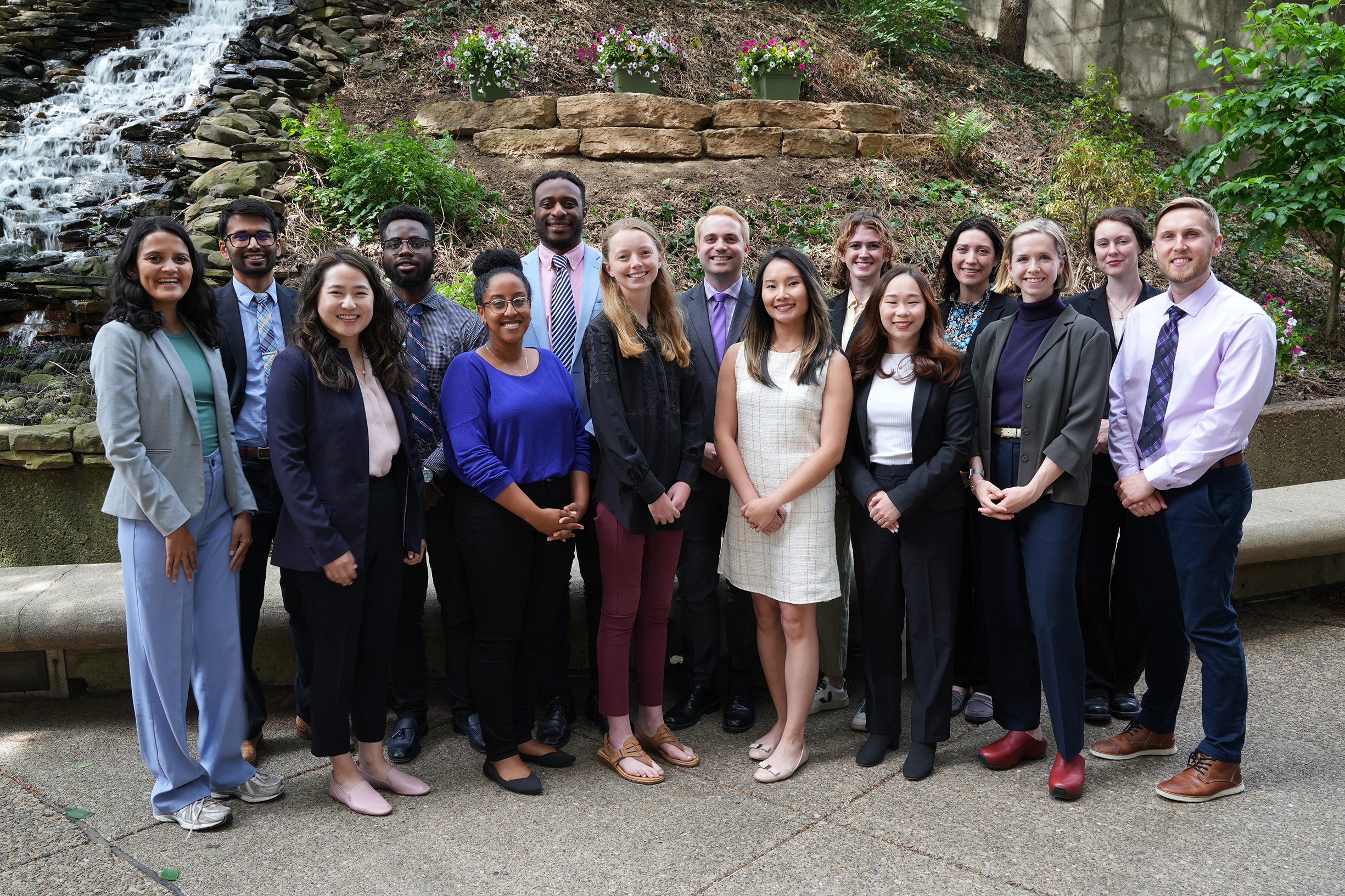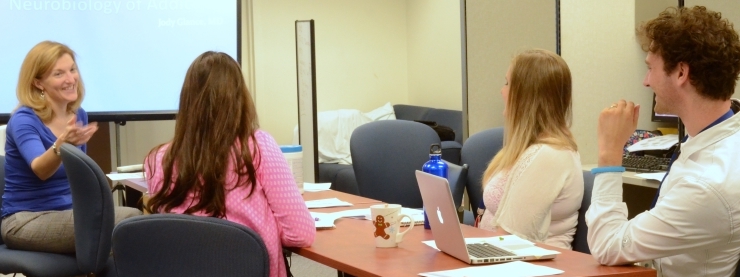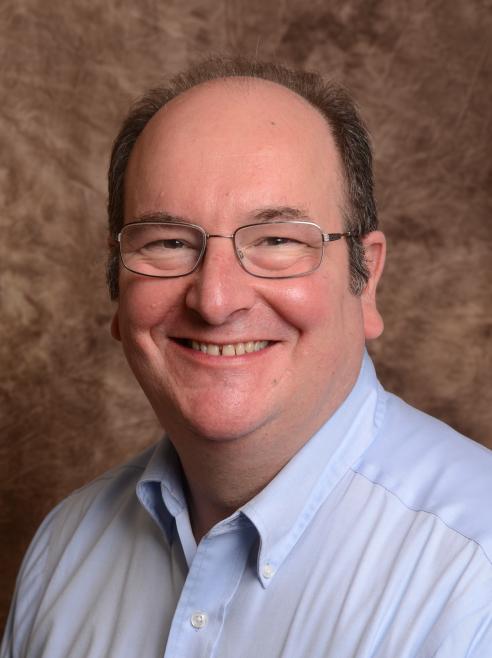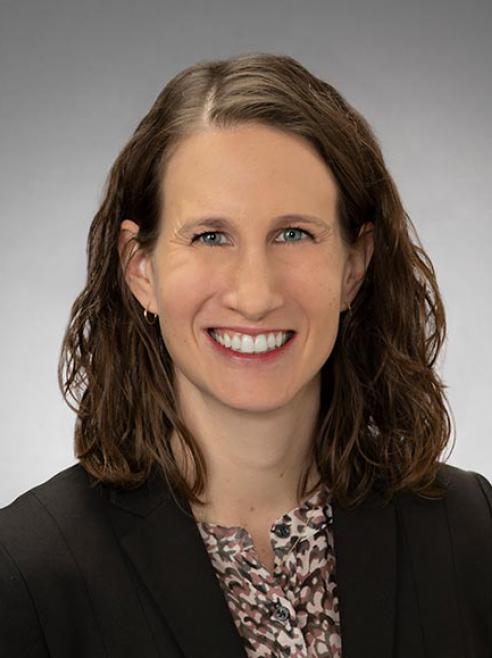The General Psychiatry Program provides rigorous instruction and diverse clinical experiences in a challenging but supportive environment. We offer training experiences in neuroscience, psychopharmacology, health equity, psychotherapy and psychosocial interventions, public and community psychiatry, and psychiatric research across these domains. Faculty members are accessible and invested in helping trainees to meet their individual needs and career goals, and given the relatively large size of the program, residents are able to be matched with faculty who share similar interests.

Residents learn to synthesize ideas through exposure to a wide spectrum of clinical practices and scientific evidence. This emphasis on empirical data is shared by members of our highly diverse faculty.
The first year is designed to provide a foundation for subsequent training in psychiatry. The clinical rotations and weekly teaching are integrated to prepare residents to competently manage a broad variety of medical and psychiatric disorders and emergencies. This is the first step in acquiring mastery over the range of skills needed by a 21st century psychiatrist.
Rotations
Below is a sample annual rotation breakdown for PGY1.
| Blocks | Rotations (4-week blocks) |
|---|---|
| 3 blocks | Psychiatric Emergency Services at UPMC Western Psychiatric Hospital |
| 3 blocks | Family Medicine at UPMC St. Margaret |
| 2 blocks | Substance Use Disorders and Dual Diagnosis Inpatient Unit at UPMC Western Psychiatric Hospital |
| 2 blocks | 2 Weeks of Neurology at UPMC Presbyterian Hospital and 2 Weeks of Night Float at UPMC Western Psychiatric Hospital |
| 1 block | Neurology at UPMC Presbyterian Hospital |
| 1 block | Substance and Trauma-Related Disorders at the Pittsburgh VA |
| 1 block | Medical Care of the Psychiatric Patient at UPMC Western Psychiatric Hospital |
The PGY1 year is split into 13 blocks of four weeks each. Residents in the General Psychiatry Program spend three blocks in family medicine, one full block in neurology, two separated blocks comprising two weeks each of neurology and night float floor coverage at WPH, and one month in Medical Care of the Psychiatric Patient. Some residents choose to spend additional time in these rotations during electives later in training. Family medicine is done through the UPMC St. Margaret’s Family Medicine program and includes three blocks of inpatient medicine. Residents spend two blocks in total with the UPMC Neurology program and work on either the neurology consult or wards team.
Residents rotate through the UPMC Western Psychiatric Hospital emergency room, Psychiatric Emergency Services (PES), for three blocks and continue to take overnight call in the PES throughout their second year. The free standing PES, separate from the medical Emergency Department at UPMC, provides psychiatric evaluation, brief counseling and crisis intervention, emergent pharmacologic management, referrals for acute inpatient hospitalization, partial day programs, intensive outpatient programs, and outpatient clinics. During the evenings, the residents are learning to be the primary medical doctors in the PES, working with a directly supervising attending.
The remaining three blocks are divided into a 1-block rotation at the Center for the Treatment of Addictive Disorders (CTAD) and Post Traumatic Stress Disorder Clinic, VA Pittsburgh Healthcare System, and a total of two blocks rotating at the UPMC Western Psychiatric Hospital on an inpatient service specializing in acute treatment of patients with comorbid psychiatric and addictive disorders.
Teaching Curriculum
The formal weekly teaching curriculum during the psychiatry rotations in PGY1 provides a fundamental psychiatric knowledge base upon which subsequent training and education will build. The curriculum includes interactive teaching sessions, seminars, case conferences, journal clubs, grand rounds and workshops. These programs are directed and taught by faculty, many of whom are renowned experts in their fields.
The second year of residency training provides a core set of experiences covering the scope of inpatient psychiatry, including clinical rotations in mood disorders, psychosis, child, geriatric, and consultation and liaison (C/L) psychiatry services. The weekly teaching sessions are closely integrated with these clinical experiences. In addition, residents begin psychotherapy training with patients and individual and group supervision by the middle of PGY2. At the end of the second year, residents can competently diagnose and treat a wide variety of common psychiatric disorders.
Rotations
Residents in the General Psychiatry Program spend 10 to 11 weeks in four specialty inpatient services, reflecting four broad areas in clinical psychiatry. Each inpatient service has "teaching teams", with one resident supervised by one attending. Residents carry no more than eight patients at any given time. On each service, residents work closely with the supervising attending and the multidisciplinary treatment team, comprising nurses, social workers, and other clinicians. Residents are given increasing independence in managing patients with time. In addition to general medical and pediatric coverage from the Medical Care of the Psychiatric Patient team, onsite medical coverage and specialty consultations are available through the UPMC Presbyterian Hospital, which is physically connected to the UPMC Western Psychiatric Hospital by an indoor tunnel. Residents continue to take overnight call at the UPMC Western Psychiatric Hospital throughout their second year, except while on C/L rotation.
The consultation and liaison (C/L) psychiatry service provides psychiatric consultation to all units (medical, surgical, transplant, intensive care units, oncology, obstetrics, gynecology, etc.) at the UPMC Presbyterian, UPMC Montefiore, and UPMC Magee Women's Hospital. Residents are assigned patients for consultation and, under supervision, provide a set of management recommendations and follow these patients for the duration of the hospital stay. Interactive teaching sessions and seminars on C/L topics are conducted daily. Residents on this service provide weekend coverage on site in the hospitals as well as evening coverage from home, coming in as necessary.
| Rotations (10- to 11-week blocks) |
|---|
| Mood Disorders Unit |
| Schizophrenia Spectrum Disorders Unit |
| Geriatric Psychiatry Unit |
| Child and Adolescent Unit |
| Consultation/Liaison Service |
Teaching Curriculum
The formal teaching curriculum during PGY2 expands on the acquisition of fundamental psychiatric knowledge that began during PGY1, and is closely linked to the clinical experiences during this year. The curriculum includes lectures, seminars, case conferences, journal clubs, grand rounds and workshops.
The third year of residency training builds on the skills and knowledge acquired during the first and second years of residency through experiences in ambulatory psychiatry. Residents work in several general and specialty clinics that provide opportunities to learn about different models of care. These models include following patients independently, seeing patients concurrently with therapists, and working in close collaboration with multidisciplinary treatment teams.
At the end of the third year, residents are able to competently diagnose and treat patients, and provide longitudinal care in a variety of outpatient settings. They also achieve increasing levels of competency in psychotherapy.
Rotations
Residents are required to complete two year-long clinics as well as six-month clinics in Geriatric and Child and Adolescent Psychiatry, respectively. In addition, residents choose, at a minimum, three six-month electives. An elective typically occurs once per week for a half-day per week. Each clinic is directed by faculty who are experts in their fields. There are no call obligations in the third year, allowing residents more time to pursue other interests and projects, as well as moonlighting opportunities. Residents continue psychotherapy training with an increasing caseload of patients and individual and group supervision.
The table below shows the required and elective rotations for PGY3.
| Rotations |
|---|
Bellefield Clinic – Mood, Anxiety, Personality Disorders (12 months) |
| Comprehensive Recovery Service - Severe Persistent Mental Illness (SPMI), Schizophrenia Spectrum Disorders (12 months) |
| Benedum Geriatric Center or Alzheimer's Disease Research Center – Old-Age Psychiatry and Major Neurocognitive Disorders (6 months) |
| Center for Children and Families – Child and Adolescent Psychiatry (6 months) |
| At least 3 Elective Outpatient Clinics (6 months each), one specifically geared toward Community Psychiatry |
| Long-term Psychotherapy |
Teaching Curriculum
The formal teaching curriculum during PGY3 provides a series of advanced topics, including courses on multiple modalities of psychotherapy, advanced psychopharmacology and evidence-based medicine.

In the final year of training, the majority of residents’ time is available for elective training and personal development suited to each resident's specific career goals. PGY4 residents "round out" their training experience by choosing electives to enhance specific aspects of their training. This important feature enables senior residents to continue to handle longitudinal caseloads under supervision.
A large number (over 40) of elective opportunities currently exist and new ones are regularly implemented by residents and faculty to further diversify the training experience. Many residents choose elective training sites to explore career opportunities and build expertise within areas of interest. There are currently no call obligations in the senior year.
Teaching Curriculum
The formal teaching curriculum during PGY4 provides a series of advanced topics and classes specifically geared toward preparation for careers after residency. Some of the time in the curriculum is set aside each year to accommodate requests by the senior class for additional coursework.
Interested in our general psychiatry residency training program? Read about how to apply and learn about the city of Pittsburgh.


